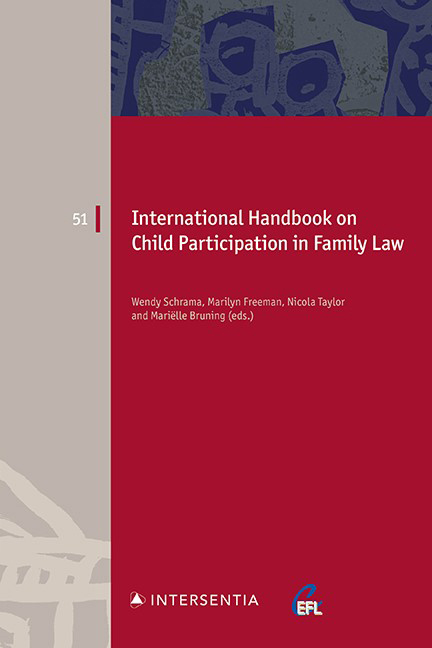Book contents
Germany
Published online by Cambridge University Press: 10 December 2021
Summary
INTRODUCTION
In Germany, family procedural law is codified in the Family Procedure Act (Gesetz ü ber das Verfahren in Familiensachen und in den Angelegenheiten der Freiwilligen Gerichtsbarkeit, FamFG). Separate from the German Civil Code of Procedure (Zivilprozessordnung, ZPO), the FamFG intends to ensure that all matters relating to family law proceedings take place before one and the same ‘large court’ – the family court. Family courts are part of the ordinary jurisdiction with special assignments.
With a total of 13,504,000 minors in Germany in 2019, the number of proceedings in parent and child issues as well as parentage and adoption matters before the local courts (Amtsgericht, AG), in which departments are competent as family courts of first instance, came to approximately 179,209. Before the Higher Regional Courts (Oberlandesgericht, OLG), competent in the second instance, the number equalled approximately 6,261 in 2019.
The provisions on family law in the German Civil Code (Bürgerliches Gesetzbuch, BGB) and the ones in the FamFG provide various possibilities for the child's participation. In parent and child matters (§ 151 FamFG) as well as parentage (§ 169 FamFG) and adoption matters (§ 186 FamFG), children are usually directly affected themselves, meaning that they must be involved as parties (§ 7 para. 2 No. 1 FamFG). In parent and child matters children must be heard from the age of 14 (§ 159 para. 1 FamFG). With the new law passed by the legislature on 25 March 2021, the mandatory child hearing under §159 para. 1 FamFG-New will be independent of the child's age. In parentage matters the court should hear children from the age of 14 (§ 175 para. 2 FamFG). In adoption matters the hearing of the child is mandatory for all children (§ 192 para. 1 FamFG). However, they are only capable of participating themselves insofar as they have reached the age of 14 and are asserting one of the few rights of objection and participation granted under civil law 10 (§ 9 para. 1 No. 3 FamFG). Children who are incapable of participating in proceedings are represented by their parents. 11 In accordance with § § 181, 1629 para. 2 and 1795 BGB, the parental representation of minors is excluded by law in certain cases of serious conflicts of interest, for example when contracting with the parent him/herself.
- Type
- Chapter
- Information
- International Handbook on Child Participation in Family Law , pp. 185 - 204Publisher: IntersentiaPrint publication year: 2021



